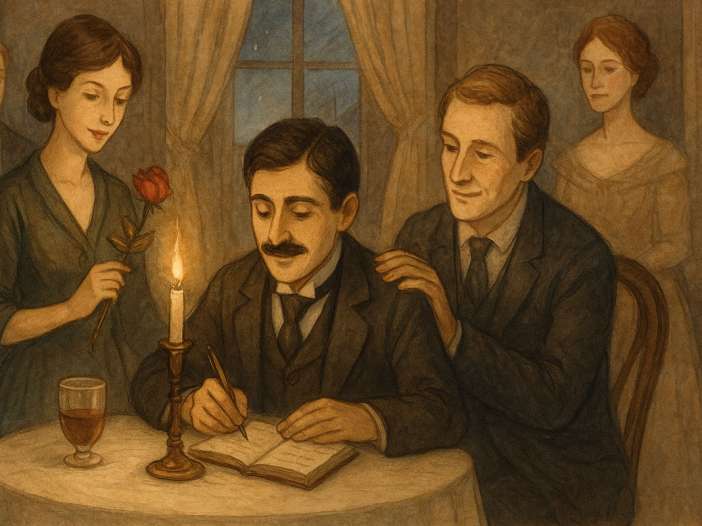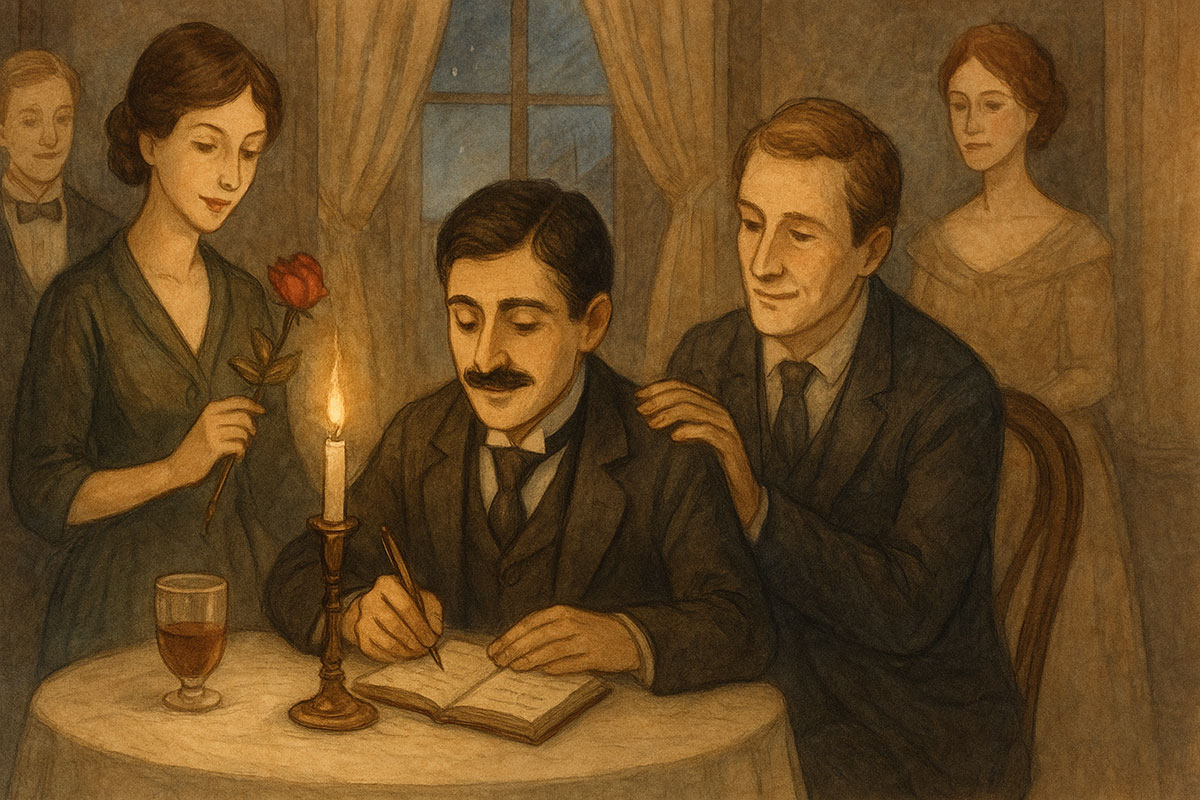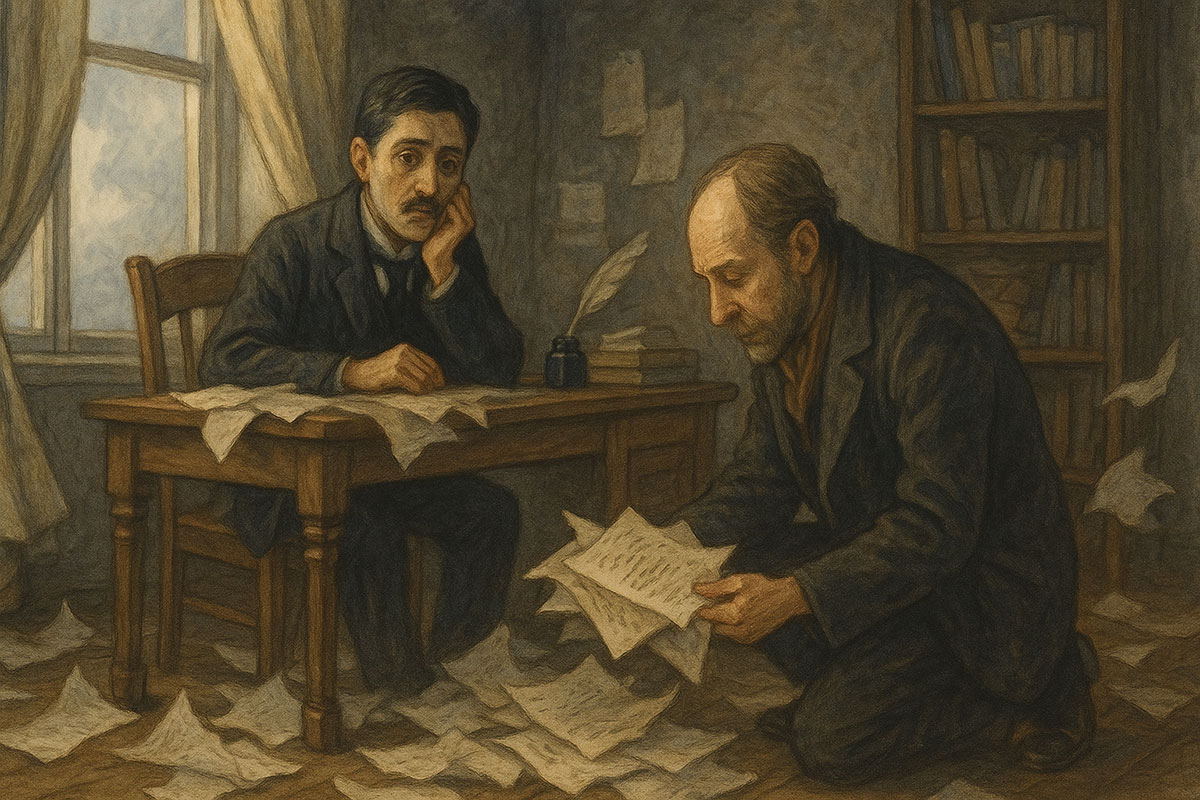
|
Getting your Trinity Audio player ready...
|

André Gide:
Paris is quieter now. Or perhaps I have simply grown quiet in the shadow of his memory.
Marcel, whose name I once hesitated to endorse, taught me—taught us all—that time is not a line, but a lacework of feeling, scent, silence, and remembrance. He saw what most of us passed over: the tremble of a teaspoon in a teacup, the sigh of a curtain stirred by memory, the unspoken ache of love that never says its name aloud.
Yes, I once refused his manuscript. It arrived in our hands like a madeleine too strange to taste, too large in spirit for our small appetites. I see now how blind I was. And yet, as is always the case with Marcel, even my mistake became a part of his genius—the rejected manuscript that outlived us all.
This, then, is not merely the story of a writer, but of a man who heard time breathing. Let us walk with him now, not through grand salons or declarations, but through the hush between thoughts—the holy space where the eternal lives.
(Note: This is an imaginary conversation, a creative exploration of an idea, and not a real speech or event.)
Chapter 1: The Boy Who Lingered in Memory

The room was quiet, hushed with that peculiar stillness only found in childhood bedrooms — where dreams cling to drapes and the air remembers lullabies. Marcel lay on the edge of a chaise, one hand tucked under his cheek, the other softly holding a linen handkerchief. The air smelled faintly of lavender, camphor, and polished wood. Outside, the Parisian twilight melted into shadow.
You sat nearby in a plush armchair too large for one person, gently turning the pages of a book — not reading, but waiting. You had learned that presence was sometimes better than speech, especially with Marcel. He hated abruptness. He responded best to atmospheres. And tonight, his atmosphere was wrapped in something close to fear.
"I’m not well again," he said, the words trembling out of him like candle smoke. "The air… it stings my throat. Mama hasn’t come to kiss me goodnight. Do you think she’s forgotten?"
You leaned forward, brushing a lock of soft brown hair from his forehead. "She hasn’t forgotten. But even mothers, dear Marcel, must take a moment to breathe. Just like you."
He frowned, his eyes wide and already too filled with memory for someone so young. “But what if she doesn’t return? What if I fall asleep and she disappears forever, and I won’t remember her voice as it really was, only as I imagine it to be?”
You recognized the spiral. It was not simply anxiety—it was the soul’s unwillingness to let go. Marcel lived in the past even as the present unfolded. He needed reassurance, yes, but more than that, he needed someone to witness the shape his heart took.
“You’re afraid memories are fragile,” you whispered, “but they’re not. You hold them so gently, Marcel, you give them more life than most people give to the moment.”
His eyes searched yours. “But doesn’t that mean I’m not really living? I’m only recording. Only remembering.”
You smiled, sadly. “Maybe. Or maybe you’re learning how to live more than once — by living it first, and then again through memory. And then again through story.”
He closed his eyes for a long moment. The muscles in his tiny jaw relaxed. “Sometimes I feel too much. Even now, I miss Mama and she’s only in the next room.”
You reached over and placed your hand in his.
“And yet you miss her as if she were centuries away,” you said softly. “That’s your gift, Marcel. You don’t just remember — you honor what is fleeting.”
A pause.
He opened his eyes and looked out the window.
“I heard a carriage,” he whispered. “Maybe it’s hers.”
You nodded, knowing full well it wasn’t. But what mattered was the hope. The boy needed the sound of return, even if it was imagined.
Then he turned to you again.
“Promise me,” he said, “if I forget how this feels — if I grow up and the world grows hard — you’ll remind me. Remind me that I once loved so hard it made me sick.”
“I promise.”
And you meant it.
Because someone had to remember the boy who lived so deeply in his small, gasping chest — the boy who taught the world that the details we overlook are often the very shape of love itself.
Outside, the night folded in. The stars blinked through lace curtains. The scent of lavender deepened.
Inside, Marcel finally slept — not as a boy letting go of the day, but as a soul making notes for eternity.
Chapter 2: The Silence After Her Footsteps

The house still held her breath.
Long after the soft heel of her slipper vanished down the corridor, long after the swish of her silk skirt was absorbed by the shadows, the silence she left behind stretched across the room like a delicate shroud. Marcel sat in the chair by the fireplace, unmoving. His hands, pale and tremulous, rested on the arms of the chair as if bracing against a world that had once again slipped from his grasp.
His mother had left.
She had done so gently, even lovingly—pressing her lips to his temple, smoothing the fringe on his forehead, murmuring that she would return in the morning. But the door had clicked softly shut, and with it came the ache of abandonment, as visceral as hunger and as sharp as regret.
I sat across from him, quiet as breath, watching the way his gaze held the door. He did not blink. He did not cry. But something in him broke open silently, the way petals fall from a flower no one is watching.
“You’re afraid she won’t come back,” I whispered.
He didn’t answer. He didn’t need to. His silence was not absence—it was music held at the pause between two notes, unbearably alive. I leaned closer and continued, my voice low, as if speaking too loudly might shatter what little certainty he still clung to.
“But she always has, hasn’t she?”
Still nothing. Only a tightening around his eyes, the flutter of his throat as he swallowed something too large for words.
“She has always returned,” I repeated. “Even when the night felt endless. Even when the world seemed cruel and vast and indifferent.”
Marcel’s breath quivered. He reached down—not for my hand, but for a small book that had fallen beside the chair. I recognized it: the one he had scribbled in since he was a child, filled with little phrases, fragments, the pollen of thought before it became prose.
He opened it slowly. A pressed violet slid from between the pages and landed near my shoe.
“Why does it hurt so much,” he asked finally, “when I know she loves me?”
The question landed between us like snow—silent, unanswerable, and deeply human.
“Because love does not cancel longing,” I replied. “It only deepens it.”
He nodded, barely. The fire crackled gently in the grate. Shadows danced across the high ceilings, and beyond the window, a pale moon was beginning to rise—like a watchful mother, returning as promised.
Chapter 3: The Friend He Couldn’t Keep

The room was filled with old laughter.
Not present, not echoing—but folded into the fabric of things, like the scent of pages in a beloved book, or the warmth of a hand long since let go. The curtains were drawn back, and through the large window, Paris bustled below, oblivious to the quiet grief blooming on the fifth floor.
Marcel sat by the writing desk, a teacup untouched before him, a letter opened but not read.
It was from Alfred.
They had once been everything to each other—mornings spent pacing the garden in fierce conversation, afternoons lost in smoke-filled cafés, speaking of music and memory and the unbearable intimacy of being understood. Marcel had never laughed the same way with anyone else. He had never dared to.
But something had shifted. A remark too sharp. A silence too long. Then distance, like frost spreading across glass, until finally—
A letter. Cool. Final. Kind, as only indifference can be.
I entered quietly and stood beside him. He did not turn. He only lifted the letter again, eyes scanning the same paragraph for the fourth time, hoping the words might rearrange into something less hollow.
“I shouldn’t be surprised,” he said softly. “I always knew he’d outgrow me.”
I said nothing. That wasn’t true. It wasn’t growth that had pried them apart—it was fear. The intimacy of their friendship had frightened them both. Not in its beauty, but in its truth. Few people could hold another person’s soul in their hands without trembling.
“You gave him more than most people even have to give,” I said gently. “You let him see behind the curtain. Not everyone is ready for that.”
He folded the letter once, twice, again—until it was too small to carry meaning. Then he held it out to the fire, and I watched it curl inward like a dying leaf.
“You loved him,” I whispered.
“I did,” Marcel replied, almost childlike in tone. “Not as the world would understand it. But… I loved him in a way that made time slow down. That made memory feel like a room we both could walk through.”
His eyes met mine, fragile but steady.
“But he left,” he said. “And I’m still here, carrying the ghosts.”
I crouched beside him, not with answers, but with presence. Sometimes the wound was too sacred for stitching.
“You write, don’t you?” I said. “Not because it fixes the ache—but because it lets the ache sing.”
A small smile flickered at the edge of his mouth.
Then, slowly, he reached for a clean page.
Outside, the light shifted—Paris bathed in gold, and the laughter in the walls quieted, resting for now.
Chapter 4: The Room He Never Left

The world was reduced to a rectangle.
Four walls. A ceiling that breathed in whispers. A door that rarely opened. And the dim glow of a green-shaded lamp, casting a gentle hue across stacked notebooks and dust-flecked air.
Marcel had retreated—not from life, but from the noise that tried to pass for it.
His bedroom was no longer just a room. It was a sanctuary, a cave, a womb of silence. Thick cork on the walls muffled every sound. The curtains were never drawn. Daylight was too crude a companion for his fragile nerves. He wrote by lamplight and memory alone.
I knocked gently before entering.
He sat on the bed, knees pulled up beneath his robe, hands clasped in his lap as if in prayer or preparation. The sheets were slightly crumpled, and beside him lay a book he hadn’t published. Another volume in the great unwritten scripture of feeling.
“You’re up,” I said quietly.
He nodded, then looked toward the window as though remembering a sky that hadn’t been seen in years.
“I don’t need the world to come in,” he said. “I have it all here.” He gestured at his chest, then the manuscripts. “It enters me through scent, through a phrase, through a remembered kiss...”
There was no bitterness in his voice—only reverence. As though time had taught him not to resent confinement, but to recognize it as an altar.
Still, I sat beside him.
“But don’t you miss it?” I asked gently. “The touch of sunlight? A stranger’s glance? The rustle of the streets?”
He looked down, and his voice was barely audible.
“I miss it like one misses a country they can never return to. Not because it was better… but because it once belonged to a version of me that could walk without trembling.”
He paused.
“I’m not afraid to go outside,” he added. “I’m afraid it won’t feel real anymore. That the wind will no longer stir the old joy. That I’ve become too made of memory.”
I reached over and opened the window an inch.
The smallest breeze stirred. It carried the scent of rain, bakery bread, and the faintest trace of lilacs from a nearby courtyard.
He inhaled.
And for a moment, the veil lifted.
His shoulders softened. His lips parted, and his eyes—not yet teary, not quite smiling—filled with something ancient.
Hope?
No. Something softer.
Permission.
To feel. To long. To keep being.
I stayed there until the candle burned low. He didn’t speak again. But his pen began to move—not fast, not urgent, just steady. As if the room had become not a tomb but a wellspring.
Chapter 5: The Goodbye He Wrote in Silence

The lamp flickered like a sigh.
Night had folded itself into the corners of the room, a hush settling over the books, the curtains, the half-filled pages on the desk. The air smelled faintly of lavender water and old ink, and from somewhere beyond the shuttered window came the occasional rustle of leaves—or memory.
Marcel lay in bed, thinner than before, as if the years had whispered him away little by little. But his gaze was wide open, not fearful, only distant—like someone standing on the edge of a train platform, listening for the hum of something coming.
I sat by him, one hand over his.
He hadn’t spoken all day, but he had written. Not with his usual urgency, nor even with his usual doubt. Just a single page in his delicate, sloping script. Folded neatly and placed beneath his pillow.
“Is it finished?” I asked softly.
He smiled faintly, not quite yes and not quite no.
“I thought I had to understand everything before I could say goodbye,” he whispered, his voice like silk on paper. “But maybe it was never about understanding. Maybe it was about noticing.”
He blinked slowly. “A madeleine in tea. The sound of mother’s footsteps. The angle of the sun on a worn chair. I tried to save it all.”
“You did,” I said. “You turned it into something that will never be forgotten.”
“But I will be,” he said. “Eventually.”
A silence hung between us, warm and unhurried.
Then I leaned close and whispered, “Only by those who never learned to listen.”
He closed his eyes.
And in that moment, the room became still—not with death, but with completion. The kind of hush that falls after the final note of a symphony, when no one claps because they are still inside it.
Outside, spring birds fluttered across a sky just beginning to glow.
A breeze slipped through the cracked window, stirring the lace curtains like breath returning to the world. On the floor, a single page had fluttered out from beneath the bed.
I picked it up.
It wasn’t a farewell. Not exactly.
It was a description of light on a stone wall, a memory of the color of his lover’s coat, and a line that simply read:
“Time is not what carries us forward. Love is.”
I tucked the page gently into his book.
And then I sat beside him, not to watch him leave, but to thank him—for showing us how to stay.
Not in place.
But in presence.
Forever noticing.
Final Thoughts by André Gide
We have wandered through his silences, listened to the rustle of memory in his rooms, and felt the ache of a soul who watched love, time, and illness pass through the same narrow window.
Marcel never shouted. He whispered—and the world leaned in.
He believed that to truly remember is to love again, and if that is true, then today, remembering him as we have, we have loved him once more.
He is not gone. He simply returned to the place where all his pages began.
As I leave this tribute, I do so with gratitude—for the man I misunderstood, and later, revered. The boy behind the curtain gave us a mirror, and in it, we saw ourselves—longing, fleeting, alive.
Merci, Marcel.
Short Bios:
Marcel Proust
French novelist, essayist, and critic best known for his monumental seven-volume work In Search of Lost Time (À la recherche du temps perdu). His writing explored memory, time, and the inner workings of the human heart with unparalleled sensitivity.
André Gide
A Nobel Prize-winning French author, Gide was a leading figure in 20th-century literature. Known for works like The Immoralist and The Counterfeiters, he championed artistic freedom, self-exploration, and the courage to confront societal norms.
Robert de Montesquiou
An aristocrat, aesthete, and poet who inspired Proust’s character Baron de Charlus. Montesquiou’s flamboyant style and sharp wit made him a fixture in Parisian high society and a muse for symbolist artists and writers.
Lucien Daudet
Painter and writer, son of author Alphonse Daudet. Lucien was a close companion of Proust in his early life, their friendship tinged with mutual admiration and romantic tension.
Reynaldo Hahn
Venezuelan-French composer and singer, and Proust’s early lover. Their bond was marked by shared refinement, letters, and music. Hahn remained a lifelong friend, deeply affected by Proust’s death.
Céleste Albaret
Proust’s devoted housekeeper, secretary, and confidante during his final years. Her loyalty, discretion, and care were crucial to the completion of his literary work. She later wrote a cherished memoir of her time with him.

Leave a Reply